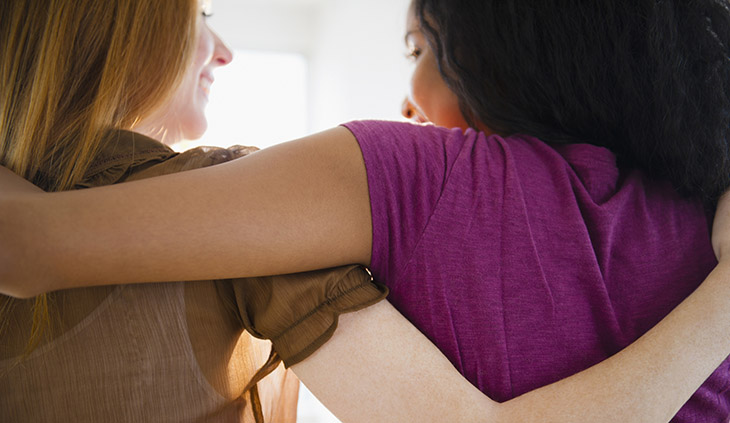In the aftermath of the divisive 2016 election, many parents are asking, “How do we talk to our children?” Many parents acknowledge that they are experiencing big feelings, lots of questions, and a desire to identify action steps for healing and moving forward. They’ve also shared that their children are having many of these same experiences. While many people are relieved, excited, and hopeful about the presidential choice, many others are experiencing shock, fear, sadness, anger and more.
Here at the Institute, we are engaged in daily conversations with each other and our community. We have been learning much together during this profoundly historic and teachable time. As families, schools, organizations and work places navigate this transitional time and engage in difficult and meaningful conversations with each other and our children, I want to share our trust in 6 good things and offer subsequent resource links for support.
1. Noticing and honoring our feelings is a good thing.
Let’s speak first to those struggling with a range of deep painful feelings. The metaphor of the oxygen mask on the plane is a vital one here. As adults, we need to put on our own oxygen masks first. When you recognize the feelings that you yourself are experiencing, name them. For example, when a wave of anger or fear rolls in, say to yourself, “This is anger,” or, “This is fear.”
Then, notice the level of intensity of the feelings. The intensity of any feeling can vary widely, but to give you a better understanding, consider the difference between a low-grade, perhaps barely noticeable even, annoyance compared to a frustration that has you burning hot with agitation.
Next, you can notice the ways feelings change over the course of a day. Observe the things that help you feel better, and of course the things that tend to make you feel worse. From this more mindful place, we can then more effectively help our children name and ride the waves of their own feelings.
Tip: For kids, using the metaphor of the emotional thermometer can help them identify the intensity of those feelings on a 0 to 10 scale for younger kids, and 0 – 100 scale for older kids. Just the act of naming feelings can actually help settle our nervous systems. The capacity to observe and mindfully tend feelings is an important practice for everyone, including those who may feel satisfied with the election as well. Being mindfully aware of our feelings invites us to know ourselves better, and when we know ourselves better we are better equipped to form responses to others that offer repair and restoration. Mindful awareness of feelings can also guide us to care for ourselves wisely.
2. Self-care practices are a good thing.
Engaging in activities that help us feel better and more connected is vital in times of change and stress. Everyone’s self-care list is going to look different.
Tip 1: Take some time to talk about the variety of activities that help each unique person in your family or friendship circle feel better. Support each other in doing the activities that help. Here are some of the activities that we’ve talked about with each other in the days since the election: Spending time in nature, savoring its beauty and restorative energy. Doing something that feels good for our bodies, like vigorous exercise or a massage. Thinking about each of our senses and what we enjoy most related to each of our senses (petting the dog; watching a cat video; sipping hot tea or chocolate; smelling lavender; mindful drawing with favorite colors). Taking a break from the media; unplugging for a few hours or a day. Connecting with friends and loved ones. Playing and laughing. Mindfully sitting with your breath.
Tip 2: One of my personal favorite breath exercises this week comes from Dr. Andrew Weil. It is called the 4-7-8 Breath, and Dr. Weil describes it as a natural tranquilizer. Start by exhaling completely through your mouth with a big whoosh. Close your mouth; inhale quietly through your nose for a mental count of 4. Hold the breath for a mental count of 7. Exhale through the mouth, with a light whoosh sound, for the mental count of 8. This is one breath cycle. Repeat it 3 more times – and no more than that in a single day. These activities can not only help us feel better, they can equip us with some grounded-ness that allows us to be more compassionate and effective in our communication with others.
3. The diversity of ideas, opinions, and experience is a good thing.
There is obviously much to learn together about speaking from an authentic position while also standing in each other’s shoes. While differences can separate us and be a source of deep pain, they can also be great opportunities for understanding and connection. Is it possible to consider this as a time for growing skills for listening, being curious, and discussing complicated tough issues with respect? I spoke with one friend who described her family as “a house divided” when it came to the election. She’s not alone. In speaking with people locally and around the country this past week, one of the prominent difficulties I hear being discussed is the vast differences within families and communities and how to navigate those.
Learning the tools for respectful and civil discourse is vital. Monica Valdivia Aguilar, LMFT, the Clinical Director of our Young Women’s Program at the Institute, was at a conference last week with attendees from around the world. She came back with stories about listening to a variety of global viewpoints and how that has enriched her understanding.
Tip: At the conclusion of this article, you will find several links to tools to help build skills for respectful civil discourse about tough topics.
4. Addressing messages about gender and leadership is a good thing.
For both girls and boys, this discussion is imperative. Kids have heard a lot of blatant and subtle messages about gender during this election cycle. Some messages have been inspiring. Others have been hateful and hurtful. Some parents, especially those with younger children, have attempted to limit kids exposure to denigrating gender messages – but believe me, our children still heard it in the media, at school, and many have most likely overheard our at-home discussions. Keep the conversation about gender alive in a way that promotes growth and positivity.
Tip 1: Check in with your kids (not just your girls) individually and as a family. How have they been affected by the gender messages? Is there something that is bothering or worrying them? Is there something that has encouraged and inspired them? I also like to pose the question in a general way, “How have kids your age been affected by the words about girls and women during the election?” Listen with curiosity. Allow them to be experts of their own experience, providing you with a window into their world. And, if your daughters or your sons feel that girls have been diminished in any way, help them recover their sense that girls matter; that all children deserve to be seen as good, capable and strong.
Tip 2: Role model with positive gender conversation. Notice stereotypes that limit boys and girls. Shine the light on girls and boys, men and women, who defy those stereotypes. Help kids identify their role models and heroes. One fun activity is to create a family collage of role models and heroes. Put up poster board or butcher paper and get to work with scissors, glue sticks and pictures. Role models and heroes will likely include family members, community and neighborhood friends, and public figures. Talk about what makes this person a role model. What qualities and actions have earned them a place on the Role Model Wall? Notice the diversity of individuals on the Role Model Wall; notice the diversity of gender, culture, race, age, religion, physical ability and other elements of diversity. This activity can be done in a day or over time. I really like doing this one over time, as it is interesting, fun, and encouraging to see the role models that emerge over the weeks and months.
5. Learning practical skills for inclusiveness is a good thing.
Most of the people I talk to value respect for all people and are deeply disturbed by the uptick in bigoted and misogynist actions this past week. This is an opportunity to talk as a family about what it means to respect others.
Tip 1: A great dinner conversation can include, “How did you treat another with respect today?” “What did you notice someone else doing that was respectful, helpful, compassionate, or inclusive?” Take time to shine the light on compassionate action and respectful discussion of differences. And don’t stop there. Kids especially need to learn very concrete skills for communicating respect and being what we call a Bold Bystander, an influencer for good at school and in their social circles. How can we role model this for them. Believe me, they are looking to us to see how we handle our bystander situations. Do we stand up for ourselves and others? Here at the Institute we highly value teaching effective communication.
Tip 2: A combination of assertiveness and compassion skills are great for the social world Tool Box. Children and teens can practice and learn to stand up for kindness, compassion, and inclusion. Practice as a family with words and different scenarios. As a Bold Bystander or as a Target, they can say with practice: “I’m not comfortable with those words. I’m going for help. Those are words that hurt and that’s not ok with me.” They can reach out and include the child or teen who is being excluded. Find out what your child’s school is providing for their social and emotional learning or character development program. The skills taught through these programs provide additional skills – ones that you can build on at home and even use yourself!
6. Practicing engaged living is a good thing.
We know that “doing something” can reduce feelings of discouragement and disempowerment. Doing something with others helps reduce isolation and stress.
Tip: Help children and teens identify the issues most important to them. Think together about action steps that are sequential and do-able. Engage in those action steps while continuing to ask, what else can we do to make a difference?
Resources for Educators and Parents:
(a special thank you to my high school alma mater Westridge for disseminating these three resources)
How to talk to children about 2016 election, civility, fear-mongering and responsible citizenship.
Judith Myers-Walls, professor emeritus of child development, Purdue University
The Importance and Practice of Informed Civil Discourse
via CSEE
Teaching Tolerance: “The Day After”
From the Garrison Institute, NY: Mindfulness and Compassion Post-Election
For those of you interested in mindfulness and compassion practices, here is a short video.
https://www.garrisoninstitute.org/blog/video-how-can-our-nation-begin-to-heal-after-this-election/
A Platform for Girls:
The organization New Moon Girls for girls ages 8 – 13 provides a monitored site where girls can share. They’ve just put up two pages. One is titled: How are you feeling about the election? The other is: Building the world of mutual respect and dignity we care about. Check out NewMoon.com.


